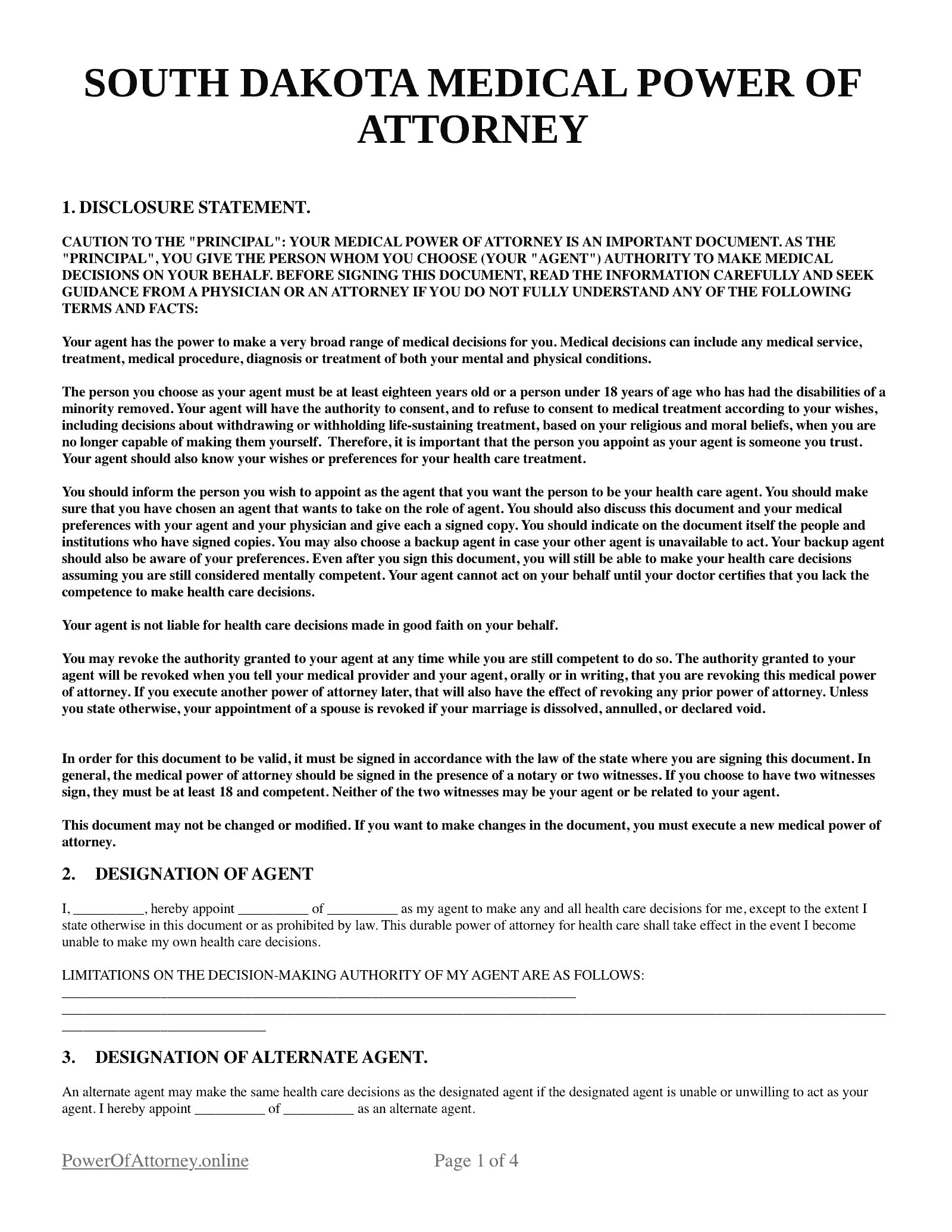Free South Dakota Medical Power of Attorney Forms
A medical power of attorney form for South Dakota (POA), also known as a healthcare POA, is a type of legal document that allows a person to make medical-related decisions on behalf of another. The person who makes the decisions is called is called an agent, while the other party is referred to as the principal.
Several types of POAs lose their authority when the principal becomes legally incapacitated. However, that is not the case with durable POAs — and medical POAs are almost always durable. This ensures medical treatment and procedures are not hampered by the principal’s incapacity.

South Dakota Medical Power of Attorney Laws
- Living Will Declaration - The South Dakota Codified Laws provide a format for the living will that a principal may sign to indicate their wishes for medical care in case they become incapacitated: “This is an important legal document. A living will directs the medical treatment you are to receive in the event you are in a terminal condition and are unable to participate in your own medical decisions. This living will may state what kind of treatment you want or do not want to receive” (SD Codified L § 34-12D-3).
- Authority to Request, Receive, Review, and Disclose Information Regarding Principal’s Health - The agent has the right to request and review the principal’s health information. It includes “legal, medical, and hospital records, execute any release or other documents that may be required in order to obtain such information and disclose such information” (SD Codified L § 59-3-2.1).
Signing Requirements for a South Dakota Medical Power of Attorney
The principal must sign the medical POA. If, for some reason, they are unable to physically sign the document, they must direct somebody to sign it for them. The law states, “The declaration must be signed by the declarant, or by another at the declarant's direction, and witnessed by two adults, or by a notary public who shall thereafter notarize the declaration” (SD Codified L § 34-12D-2).
How To Write a Medical Power of Attorney Form for SD
Here are the steps to creating a Medical Power of Attorney for South Dakota.
1. Choose the right person to be your agent
Selecting an agent is one of the most critical steps when creating a Medical Power of Attorney for South Dakota. The agent has a significant role in ensuring all of the principal’s wishes that pertain to their medical care are followed.
As a principal, you need to find someone you can trust with your life — in the most literal sense. For this reason, most principals would choose a family member as their agent. It could be the spouse, child, sibling, or parent. In most cases, they can be trusted to decide carefully and thoughtfully regarding the principal’s medication, treatment, medical procedures, end-of-life care, and residential facility.
However, some principals may be worried about forcing a family member to make difficult end-of-life decisions and prefer someone unbiased. It could be a distant relative or a lawyer.
2. Discuss your wishes with your agent
Even when the agent has the power to make healthcare decisions on the principal’s behalf, the principal still has agency over their healthcare. That’s why a discussion must be had so that the agent will only do what the principal would’ve wanted in time of incapacity.
The principal can also write a will along with the POA, where they can clearly declare their healthcare wishes before they are declared mentally incompetent.
3. Download a printable South Dakota Medical POA
For your convenience, download a South Dakota Medical POA template. Fill out the form and include all the acts you wish the agent to carry out in case you are declared mentally incompetent.
4. Sign the South Dakota Medical Power of Attorney PDF
Review the document thoroughly. As soon as you are satisfied with everything on it, sign the document and write the date of signing. To make it legal, have a notary public attest to the document's integrity. If a notary public is unavailable, you can ask 2 witnesses to make the attestation.
5. Use the Medical POA in South Dakota
Provide original copies of the document to significant people and parties, such as the agent, your physician, and close family members. Ensure the agent brings the original copy of the document every time they make healthcare decisions.